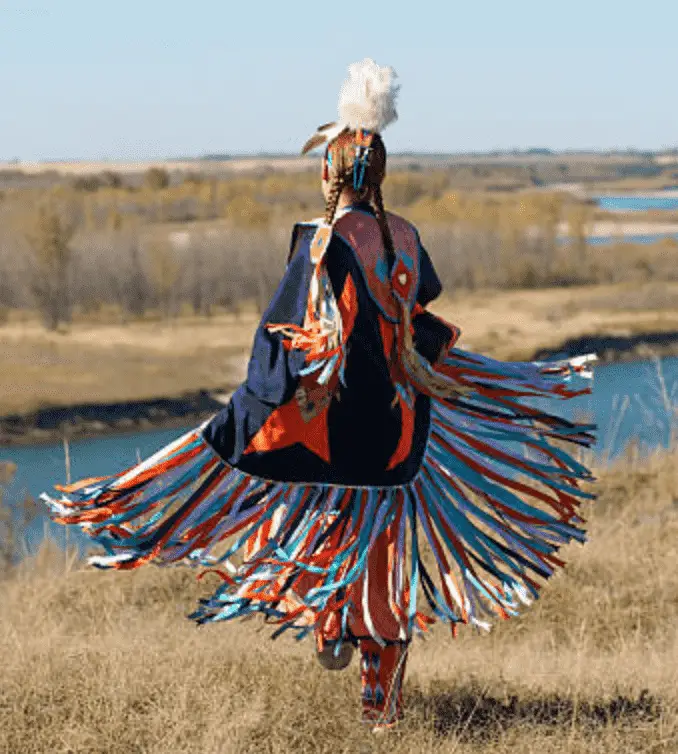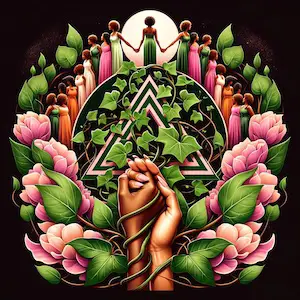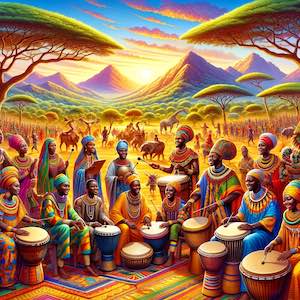In the heart of North America’s Great Lakes region, the Ojibwe people carry a rich cultural and spiritual legacy. Chants are a cornerstone of Ojibwe heritage and are both songs and narratives that encapsulate the community’s connection to the earth, their culture and ancestors.
This article explores Ojibwe chants, into their linguistic roots, diverse types, spiritual essence, and the unifying beat of the drum that threads through each melody.

Table of Contents
Introduction to Ojibwe Chants
The Ojibwe people, indigenous to the vast Great Lakes region of North America, have long been the custodians of a rich and vibrant cultural heritage, vividly preserved in their music and, more specifically, in their chants. These chants are far more than mere melodies; they are potent narratives that encapsulate the community’s history, spirituality, and the very essence of daily life. As we embark on this exploration of Ojibwe chants, we are not just uncovering a musical tradition but are delving into the heart and soul of Ojibwe culture.
Central to the understanding of these chants is the Ojibwe language itself—a language that does much more than facilitate communication. It serves as the living, breathing vessel of the community’s heritage. The Ojibwe language, a member of the Algonquian linguistic family, echoes the profound connection between the people and the vast landscapes of Canada and the United States, stretching its linguistic threads across the continent. The language’s unique structure, characterized by rich sounds and intricate grammars, makes it an ideal conduit for the expressive and profound nature of the chants.
The Ojibwe language and chants intertwine in a dance of cultural significance. The chants, articulated in the Ojibwe tongue, are not just recitations but are imbued with the power to convey wisdom, connect with the spiritual realm, and narrate the tales of ancestors and heroes. The language’s nuanced inflections and rich tonalities add layers of meaning to the chants, making each word, each phrase, a resonant echo of the Ojibwe way of life.
The Spiritual Essence of Ojibwe Chants
At the very core of Ojibwe chants lies a profound spiritual essence, a deep-seated reverence for the interconnectedness of life that is central to the Ojibwe worldview. These chants are far more than simple songs or verbal expressions; they are profound rituals, a sacred means of communication with the spiritual realm, and a bridge that connects the physical world with the mystical.
For the Ojibwe people, every chant is a thread in the fabric of the universe, weaving together the elements of earth, sky, and water with the human experience. The chants are imbued with the power to transcend the mundane, transforming ordinary moments into times of deep spiritual significance. They are not just heard but are felt, resonating within the soul and echoing the heartbeat of Mother Earth.
The spiritual essence of these chants manifests in various forms. They serve as a channel for healing, where the rhythmic cadence and harmonious melodies work to restore balance and wellbeing. In times of illness or distress, the chants act as a conduit for the healing energies of the universe, enveloping the individual in a cocoon of spiritual warmth and comfort.
Moreover, Ojibwe chants play a pivotal role in ceremonies and rituals, marking the rites of passage and the changing of seasons. They are integral to ceremonies that honor the cycles of life, from birth to death, from planting to harvest. Each chant carries with it the wisdom of the ancestors, a timeless legacy that imparts lessons of life, love, courage, and resilience.
The spiritual essence of these chants is also a testament to the Ojibwe’s profound connection with nature. The lyrics often reflect a deep respect for the natural world, acknowledging the sacredness of animals, plants, and the elements. This reverence for nature is not passive; it’s an active, living relationship where every chant is an act of respect, a recognition of the symbiotic bond between humans and the environment.
Types of Ojibwe Chants
From healing to celebration, from mourning to marking the rhythms of nature, these chants are an intrinsic part of the cultural and spiritual landscape of the Ojibwe people. Here, we explore the diverse types of Ojibwe chants, offering a glimpse into their profound meanings and the occasions they honor.
- Healing Chants
- “Mino-bimaadiziwin” (The Path of a Good Life)
- Lyrics: “Mino-bimaadiziwin, mino-bimaadiziwin, Aki miinawaa nibi, Gizhemanidoo”
- Meaning: This chant invokes the concept of “mino-bimaadiziwin,” which translates to “living the good life” or living in harmony with the Creator’s teachings. The chant calls upon the earth (“Aki”) and water (“Nibi”), asking for their healing essence. It’s a plea for balance, wellness, and harmony with all of creation, reflecting the belief that health is not just an individual state but a communal, holistic experience.
- “Anishinaabe Mino-Bimaadiziwin” (The Good Life of the People)
- Lyrics: “Anishinaabe mino-bimaadiziwin, Aki miigwech, Nibi miigwech, Mino-bimaadiziwin”
- Meaning: This chant emphasizes the concept of “mino-bimaadiziwin” or living the good life in harmony with the teachings of the Creator. It expresses gratitude (“miigwech”) to the Earth (“Aki”) and Water (“Nibi”), essential elements for a balanced and healthy life. The repetition of “mino-bimaadiziwin” underscores the importance of striving for harmony and wellness in all aspects of life.
- “Gizhawenimaa Aki” (Love the Earth)
- Lyrics: “Gizhawenimaa Aki, miinawaa nibi, Zhawenimaa migizi, miigwech nibi”
- Meaning: This healing chant expresses love and gratitude towards the earth (“Aki”) and water (“Nibi”), recognizing their nurturing and life-giving properties. “Zhawenimaa migizi” means “cherish the eagle,” symbolizing respect for all living creatures and the interconnectedness of life. The chant is a prayer for harmony and balance, asking for the healing powers of nature to restore and rejuvenate.
- “Biskakone-e-yaa” (Spread the Light)
- Lyrics: “Biskakone-e-yaa, Nibwaakaawin, Miigwech Aki, Miigwech Nibi”
- Meaning: This chant calls for enlightenment and understanding (“Nibwaakaawin”) to spread across the community, much like the morning light disperses darkness. “Miigwech Aki” (thank you, Earth) and “Miigwech Nibi” (thank you, Water) are expressions of gratitude towards nature for providing healing and sustenance. It’s a plea for wisdom and clarity to heal the spirit and mind.
- “Nookomisnaa Aki” (Grandmother Earth)
- Lyrics: “Nookomisnaa Aki, miigwech giizhigong, Wiindamaageyaa, miigwech nibi”
- Meaning: This chant pays homage to “Nookomisnaa Aki” (Grandmother Earth), seeking her wisdom and nurturing. “Miigwech giizhigong” (thank you, Sky) expresses gratitude for the guidance and blessings from above. “Wiindamaageyaa” (hear us) is a plea for the earth and sky to listen to the people’s prayers, and “miigwech nibi” (thank you, Water) acknowledges water’s vital role in healing and life.
- “Mino-bimaadiziwin” (The Path of a Good Life)
- War Chants
- “Ogichidaa” (Warrior’s Chant)
- Lyrics: “Ogichidaa, niin wiikaa, Gwayakwaadiziwin, niin wiikaa”
- Meaning: This chant honors the “Ogichidaa,” or warriors, and is often sung to embolden and protect them. “Gwayakwaadiziwin” signifies bravery and courage. The chant is a powerful affirmation, instilling strength and valor in the warriors, reminding them of their courage and duty to protect their community.
- “Bimaadiziwin Bizaan” (Quiet Life of Bravery)
- Lyrics: “Bimaadiziwin bizaan, Ogichidaa niin wiikaa, Maampii akiing, niin wiikaa”
- Meaning: This chant speaks to the warrior’s path of quiet bravery and the importance of living a life of courage and integrity. “Bimaadiziwin bizaan” translates to a peaceful or quiet life, while “Ogichidaa” refers to a warrior. The phrase “Maampii akiing” means “here on earth,” grounding the warrior’s courage in the present and in their duty to their community and land.
- “Zoongide’ewin Akiing” (Courage on Earth)
- Lyrics: “Zoongide’ewin akiing, Ogichidaa, Miigwech gidakiiminaan, Miigwech wiikaa”
- Meaning: This powerful chant evokes courage (“Zoongide’ewin”) and strength in the warriors (“Ogichidaa”) as they stand to protect their land and people. “Miigwech gidakiiminaan” (thank you for our lands) and “Miigwech wiikaa” (thank you always) express gratitude to the Earth and the Creator for providing strength and courage. It’s a rallying call to defend and honor the sacred bond between the people and their land.
- “Akiing Ogimaawiin” (Leadership on Earth)
- Lyrics: “Akiing ogimaawiin, Ogichidaa, Miigwech mazina’igan, Miigwech endaawaad”
- Meaning: This chant invokes the spirit of leadership and bravery (“Akiing ogimaawiin”) in the warriors (“Ogichidaa”). “Miigwech mazina’igan” (thank you for the teachings) expresses gratitude for the ancestral wisdom passed down through generations, and “Miigwech endaawaad” (thank you for the journey) honors the path the warriors take to protect their people and land.
- “Gichi-Mookomaan Ogichidaa” (Great Warrior of the People)
- Lyrics: “Gichi-mookomaan ogichidaa, Wiindigooji-ogichidaa, Gichi-mookomaan ogichidaa”
- Meaning: This chant is a powerful call to the warriors (“ogichidaa”), invoking the strength of the “Gichi-mookomaan” (great warrior). It’s a rallying cry for bravery and resilience, reminding the warriors of their duty to protect and defend their community. The repetition of “ogichidaa” reinforces the collective spirit and strength of the warriors.
- “Ogichidaa” (Warrior’s Chant)
- Chants for Harvest
- “Miigwech bizindawiyeg” (Thanksgiving for the Harvest)
- Lyrics: “Miigwech bizindawiyeg, miinawaa gidakiiminaan, Aki miinawaa nibi, miigwech”
- Meaning: This chant is a song of gratitude, “miigwech” meaning “thank you.” It’s sung to give thanks for the harvest (“bizindawiyeg”) and all the gifts of the earth (“gidakiiminaan”). The mention of “Aki” (earth) and “Nibi” (water) signifies the gratitude for the natural elements that sustain life. It’s a humble acknowledgment of nature’s bounty and the interconnectedness of all life forms.
- “Giizhigad Anishinaabewiyang” (Day in the Life of the People)
- Lyrics: “Giizhigad anishinaabewiyang, miigwech ji-bimaadiziying, Miinawaa giizhigad, miigwech nibi”
- Meaning: This chant is a song of gratitude for the day-to-day life and sustenance provided by the earth. “Giizhigad anishinaabewiyang” translates to a day in the life of the people, and “ji-bimaadiziying” means living or life. The chant is an expression of thankfulness for every new day and the natural resources that sustain life, underscoring the deep respect for nature’s cycles and bounty.
- “Bimaadiziiwin Nibiish” (Life of the Waters)
- Lyrics: “Bimaadiziiwin nibiish, Miigwech giizhigong, Miigwech akiing, Miigwech manoomin”
- Meaning: This chant gives thanks for the “Life of the Waters” (“Bimaadiziiwin nibiish”), crucial for the sustenance of crops and the community. “Miigwech giizhigong” (thank you, Sky) and “Miigwech akiing” (thank you, Earth) acknowledge the elements’ roles in nurturing life. “Miigwech manoomin” (thank you, Wild Rice) specifically thanks the sacred grain, a staple and a gift from the earth, celebrating its abundance and the nourishment it provides.
- “Miigwech Giizhigong” (Thank You Sky)
- Lyrics: “Miigwech giizhigong, Miigwech ji-miigiweyang, Aki miinawaa nibi, Miigwech biindigen”
- Meaning: This harvest chant expresses gratitude to the sky (“Giizhigong”) for sunlight and rain, essential for crop growth. “Miigwech ji-miigiweyang” (thank you for giving) reflects the appreciation for the bounty received. The mention of “Aki” (Earth) and “Nibi” (Water) highlights the interconnectedness of all natural elements in sustaining life. “Miigwech biindigen” (thank you for coming) is a welcoming of the harvest and the abundance it brings.
- “Mashkikiwan Nibiish” (Medicinal Waters)
- Lyrics: “Mashkikiwan nibiish, Miigwech giizhigong, Miigwech akiing, Mashkikiwan nibiish”
- Meaning: This chant is a song of gratitude for the medicinal waters (“mashkikiwan nibiish”), recognizing their importance in nurturing life and health. “Miigwech giizhigong” (thank you, Sky) and “Miigwech akiing” (thank you, Earth) express appreciation for the natural elements that provide healing and sustenance. The chant is a humble acknowledgment of nature’s gifts and the interconnectedness of all life forms.
- “Miigwech bizindawiyeg” (Thanksgiving for the Harvest)
- Love and Marriage Chants
- “Wiisinidaa minawaa dibaajimowin” (Feast and Story of Love)
- Lyrics: “Wiisinidaa minawaa dibaajimowin, Zoongide’ewin, niin wiikaa”
- Meaning: This chant celebrates love and union, often performed during weddings or anniversaries. “Wiisinidaa” (let’s eat) and “dibaajimowin” (story) symbolize the coming together of families and communities to share food and stories. “Zoongide’ewin” stands for strong-heartedness or courage, highlighting the strength and bravery it takes to commit to the journey of love together.
- “Zaagidwin Akiing” (Love on Earth)
- Lyrics: “Zaagidwin akiing, Miigwech debwewin, Miigwech zaagi’idiwin, Zaagidwin akiing”
- Meaning: This chant celebrates the presence of love (“zaagidwin”) on Earth (“akiing”), acknowledging the profound bond between partners. “Miigwech debwewin” (thank you for truth) and “Miigwech zaagi’idiwin” (thank you for love) express gratitude for the honesty and love that form the foundation of a strong relationship. The repetition of “zaagidwin akiing” emphasizes the deep-rooted and enduring nature of love in the community.
- “Inendamowin Miinawaa Zaagi’idiwin” (Thought and Love)
- Lyrics: “Inendamowin miinawaa zaagi’idiwin, Niin wiikaa gegoo, miinawaa dibaajimowin”
- Meaning: This chant celebrates the mental and emotional union of love and thought. “Inendamowin” (thought) and “zaagi’idiwin” (love) represent the deep connection and understanding between partners, while “gegoo” (everything) and “dibaajimowin” (story) symbolize the shared experiences and journey of life. The chant honors the holistic union of hearts and minds in love and marriage.
- “Zaagi’idiwin Niinawind” (Love Among Us)
- Lyrics: “Zaagi’idiwin niinawind, Maampii wiikaa, Miigwech debwewin, Miigwech dibaajimowin”
- Meaning: This chant celebrates the love shared within the community (“Zaagi’idiwin niinawind”) and acknowledges the timeless nature of this bond (“Maampii wiikaa” – here and always). “Miigwech debwewin” (thank you for truth) and “Miigwech dibaajimowin” (thank you for the story) express gratitude for honesty and the shared narratives that bind people together in love and unity.
- “Debwewin Akiing” (Truth on Earth)
- Lyrics: “Debwewin akiing, Miigwech zaagi’idiwin, Miigwech dibaajimowin, Miigwech miinawaa”
- Meaning: This chant centers around the truth and honesty (“Debwewin akiing”) that form the foundation of love and marriage. “Miigwech zaagi’idiwin” (thank you for love) expresses gratitude for the love shared between partners. “Miigwech dibaajimowin” (thank you for the story) honors the couple’s journey together, and “Miigwech miinawaa” (thank you again) is a repeated expression of thanks, acknowledging the continuous cycle of giving, receiving, and sharing in a loving relationship.
- “Wiisinidaa minawaa dibaajimowin” (Feast and Story of Love)
The Role of Drumming in Ojibwe Chants
The drum, often referred to as the “heartbeat of the nation,” is central to Ojibwe ceremonies and social gatherings. Its beat is more than a musical background; it is a pulse that harmonizes the singers, dancers, and the community in a shared experience. Each beat of the drum is a call, an invitation to join in the communal expression of joy, sorrow, reverence, or celebration.
In Ojibwe culture, the act of drumming is imbued with deep spiritual significance. The drum is often treated with the same respect as a living being, cared for and honored in ceremonies. It is believed that the drum carries the spirit of life itself, echoing the rhythms of the natural world, from the gentle tapping of rain on the earth to the thunderous heartbeat of a stampede.
The drumming in Ojibwe chants serves several purposes:
- Spiritual Conduit: The drumbeat is seen as a voice, a way to communicate with the spirits and the Creator. It is said that the vibrations from the drum can reach the spiritual realm, carrying the prayers, intentions, and emotions of the people.
- Healing Rhythms: In healing ceremonies, the steady, rhythmic beat of the drum is believed to align with the natural rhythms of the body and the earth, promoting physical, emotional, and spiritual healing. The vibrations are thought to penetrate deep into the soul, restoring balance and harmony.
- Narrative Rhythm: Ojibwe chants often tell stories, recounting tales of heroes, legends, and the teachings of the elders. The drumbeat provides the narrative rhythm, guiding the pace of the story and accentuating the drama and emotion of the chant.
- Community Unity: The drum brings people together, creating a sense of unity and shared purpose. Whether in times of celebration or mourning, the drum gathers the community, allowing individuals to move and sing as one. This unity is fundamental to the Ojibwe way of life, reinforcing social bonds and shared cultural identity.
FAQ
Can non-Ojibwe individuals learn and participate in Ojibwe chants?
While Ojibwe chants are deeply rooted in the culture and spirituality of the Ojibwe people, there is often a spirit of sharing and education in indigenous communities. Non-Ojibwe individuals interested in learning about the chants should approach with respect, openness to learning, and an understanding of the cultural significance of these traditions. It’s advisable to seek guidance from Ojibwe cultural practitioners or community leaders.
See Related Posts

Gregorian Christmas Chants

Love Spell Chants

Best Softball Chants for U12

AKA Sorority Chants

Argentina Football Chants

Short Chants and Cheers

Alabama Football Chants

Everything to Know About African Chants

